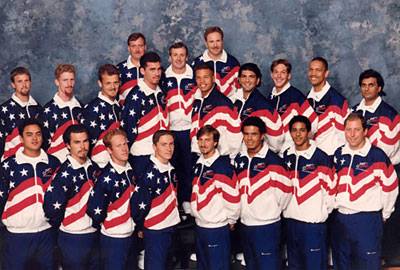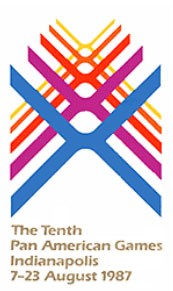
On this day 31 years ago, Jon O’Haire ’77 and the USA men’s field hockey team topped Bermuda, 3-0, in the first round of the 10th Pan American Games held in Indianapolis, IN. Here is the recap of the game from Bill Dwyre of the LA Times.
The Day the Goalie Took it Easy: Field Hockey Team Doesn’t Allow Shot on Goal in 3-0 Win
Guys like Gump Worsley and Tony Esposito would have been proud of Jon O’Haire Sunday. Maybe envious. That is, if they had any idea what field hockey was.
O’Haire is the goalie for the U.S. field hockey team in the Pan Am Games. His game is played on a field of artificial turf 100 yards long and 60 yards wide. It is kind of like ice hockey on grass, or lacrosse without the helmets and the funny scoop sticks.
It is usually played in front of crowds consisting of mom and dad and whichever relatives can be blackmailed into showing up. Since the standard uniform is shorts and knee socks, the most common comment from the casual fan afterward is how cute the players’ knees were.
So it was in that inauspicious setting that O’Haire, of Los Angeles, found his own little corner of athletic history. His U.S. team beat Bermuda in a first-round game, 3-0. And not only was the game a shutout. The U.S. team did not allow a shot on goal. That’s right. None. Zero. Zilch.
Granted, this is not the NHL. Or World Cup in soccer. Or even the MISL.
But for anybody who plays or watches sports that have, as a last line of defense, a goaltender, that statistic is mind-boggling.
Coach Ric Purser of Thousand Oaks took the semi-casual approach to the statistic:
“Well, that sure doesn’t happen very often,” he said.
O’Haire, trying and failing to remember if and when it had last happened to him, said: “It happens… I guess it happens. Not a lot, really, but sometimes against weaker teams… The last time might have been the last Pan Am Games in Caracas. We’ve been playing stronger teams since then, so it wouldn’t happen then.”
The amazing thing about O’Haire’s game was that he did little to contribute to it. In fact, it could be argued that he did nothing, but then that gives him no credit for staying awake and at least semi-alert for two 40-minute halves while his nine teammates scampered around in the distance, slapping at a hard round plastic ball. At least they could amuse themselves. O’Haire didn’t even have a good book handy.
Purser summed it up well afterward when he said, “This was not a classic game to watch. Bermuda can’t play at all.”
And O’Haire said, “They only got the ball in our circle (a fairly large attacking area adjacent to the goal) two times.
“When that is happening, you have to play (mental) games to keep in the game. I try to predict the play, what’s coming next. And I yell a lot to my teammates.”
No matter what the circumstances were of O’Haire’s amazing day, an argument could be made that he had one coming. His road to Sunday’s special moment has been quite rocky.
A graduate of the State University of New York at Stony Brook, he took up the sport just months before the 1983 Pan Am Games in Caracas.
“I saw a field hockey game sometime in 1982 on ESPN,” he said. “I had played a couple of sports as a goalie, things like soccer and lacrosse. And when I was in high school, my soccer team used to play a game against the school’s field hockey team. So I had kind of an idea of what it was.
“And when I saw the game on TV, they said that it was a sport that not too many people knew about, or participated in.”
So O’Haire made a few phone calls, found that a field hockey official, John Green, was looking for a goalie for his team in Connecticut. And O’Haire’s career was off and kicking. For a while.
He played goalie on the ’83 Pan Am team that finished fourth, dropping the bronze medal game to Chile, 1-0. And when the hotbed of the sport shifted from the East to California–mostly the San Fernando Valley–and with the ’84 Olympics set for Los Angeles, logic told O’Haire to go West.
So he did, taking a job as library purchasing agent with The Los Angeles Times, a job he still holds today, when he’s not competing nationally and internationally. And he was all set to stay on as the U.S. goalie for the Olympics.
But he didn’t make the team.
“I was kind of a rare bird in field hockey, because I was left-handed and I was playing goalie that way,” he said.
After spending a frustrating summer of ’84 watching, rather than competing in, the Games, O’Haire did what any self-respecting left-handed field hockey goalie would do in that situation: He trained himself to play right-handed.
“It was pretty tough at first… really kind of strange,” he said. “Mostly, I taped my left arm to my side and learned it that way.”
Lipsher and Stiles are out of field hockey now and O’Haire is the goalie of the future for the U.S. program. And that could be especially meaningful if the team wins a gold medal here, or wins at least the silver behind Argentina, but ahead of Canada. A gold medal would put the U.S. team in the Seoul Olympics. A silver ahead of Canada might very well do it, too, since Argentina has already qualified and doesn’t need the Pan Am berth even if it wins it.
For O’Haire, that would be very nice, very special. In fact, his teammates might even let him touch the ball once in awhile.
O’Haire and the U.S. team went on to win bronze at the games with a 3-2 win over Chile, one of 83 bronze medals won by the Americans as part of their 370 total medals. Cuba was second in the medal count with 175. The hardware was the team’s first since the U.S. took bronze in 1967 and was one of three consecutive bronze medals along with 3rd place finishes in 1991 and 1995. O’Haire was also a member of the 1995 squad.
